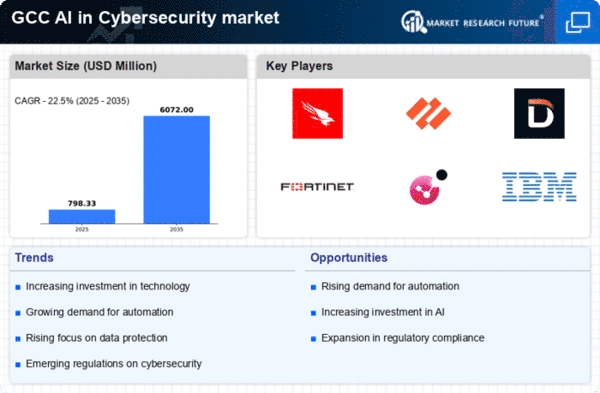Rising Cyber Threats
The escalating frequency and sophistication of cyber threats in the GCC region is a primary driver for the AI in Cybersecurity market. Organizations are increasingly targeted by cybercriminals, leading to substantial financial losses. In 2025, it is estimated that cybercrime could cost businesses in the GCC upwards of $6 billion annually. This alarming trend compels companies to adopt advanced AI-driven cybersecurity solutions to enhance their defenses. The ai in-cybersecurity market is expected to grow as businesses seek to mitigate risks associated with data breaches and ransomware attacks. The urgency to protect sensitive information and maintain customer trust drives investment in AI technologies that can predict, detect, and respond to threats in real-time.
Government Initiatives and Support
Government initiatives aimed at bolstering cybersecurity infrastructure in the GCC are significantly influencing the AI in Cybersecurity market. Various national strategies have been implemented to enhance digital security, including the establishment of cybersecurity frameworks and funding for innovative technologies. For instance, the UAE's National Cybersecurity Strategy emphasizes the importance of AI in combating cyber threats. This governmental support not only encourages private sector investment but also fosters collaboration between public and private entities. As a result, the ai in-cybersecurity market is likely to experience accelerated growth, with increased funding and resources allocated to develop and implement AI solutions that address the unique challenges faced by the region.
Digital Transformation Across Industries
The ongoing digital transformation across various sectors in the GCC is a significant catalyst for the AI in Cybersecurity market. As organizations increasingly adopt digital technologies, the attack surface for cyber threats expands, necessitating advanced security measures. In 2025, it is projected that the digital economy in the GCC will reach $100 billion, further intensifying the need for robust cybersecurity solutions. Companies are recognizing that traditional security measures are insufficient in the face of evolving threats, prompting them to invest in AI-driven cybersecurity solutions. This shift not only enhances security but also enables organizations to leverage data analytics for proactive threat detection and response, thereby driving growth in the ai in-cybersecurity market.
Increased Awareness of Cybersecurity Risks
There is a growing awareness among businesses and consumers in the GCC regarding the risks associated with cyber threats, which is propelling the AI in Cybersecurity market. As high-profile data breaches and cyberattacks make headlines, organizations are compelled to prioritize cybersecurity. This heightened awareness leads to increased demand for AI-based solutions that can provide comprehensive protection against potential threats. In 2025, it is estimated that 70% of businesses in the GCC will have implemented AI-driven cybersecurity measures as part of their risk management strategies. This trend indicates a shift in mindset, where cybersecurity is viewed as a critical component of business operations, further driving the growth of the ai in-cybersecurity market.
Integration of AI with Existing Security Systems
The integration of AI technologies with existing security systems is emerging as a crucial driver for the AI in Cybersecurity market. Organizations in the GCC are increasingly seeking solutions that can enhance their current security frameworks without necessitating a complete overhaul. AI can augment traditional security measures by providing advanced analytics, threat intelligence, and automated responses. This integration allows for a more efficient allocation of resources and improved incident response times. As businesses recognize the value of AI in enhancing their cybersecurity posture, the ai in-cybersecurity market is likely to witness substantial growth. In 2025, it is anticipated that the adoption of AI-enhanced security systems will increase by 50%, reflecting the demand for innovative solutions that complement existing infrastructures.

















